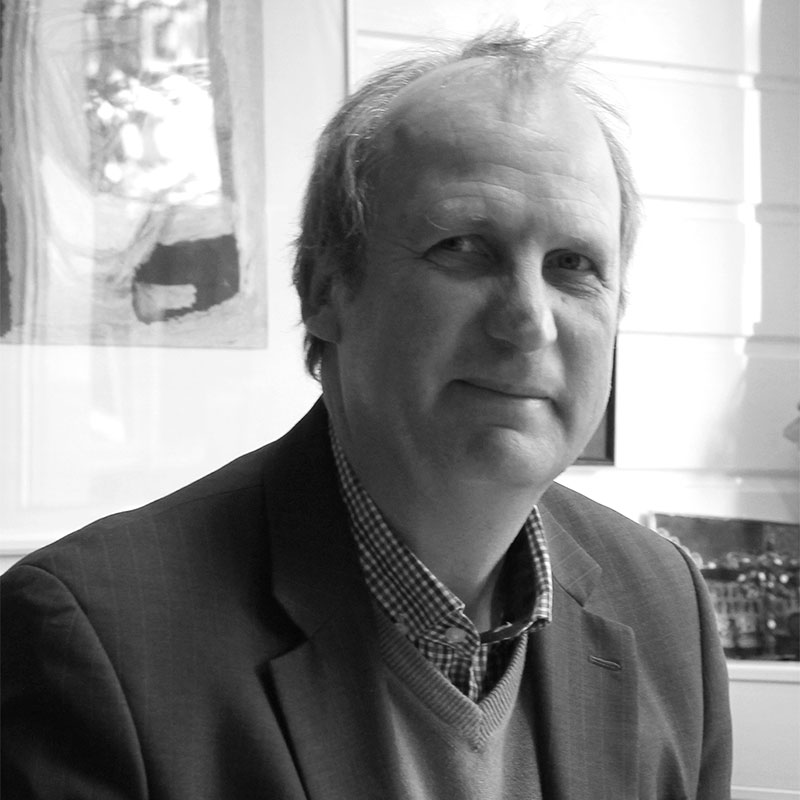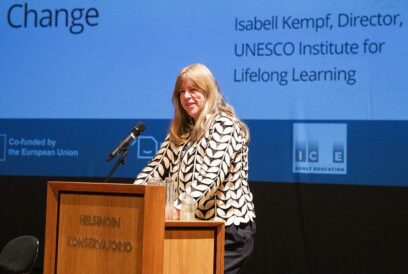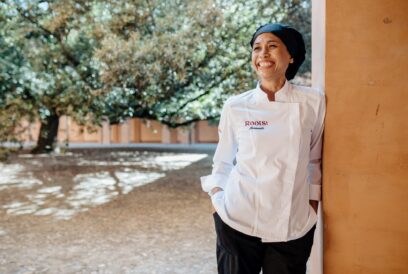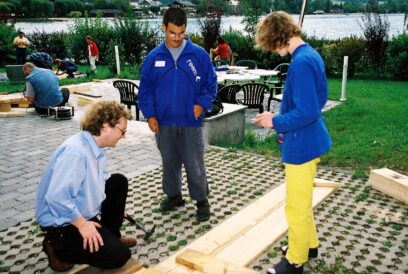
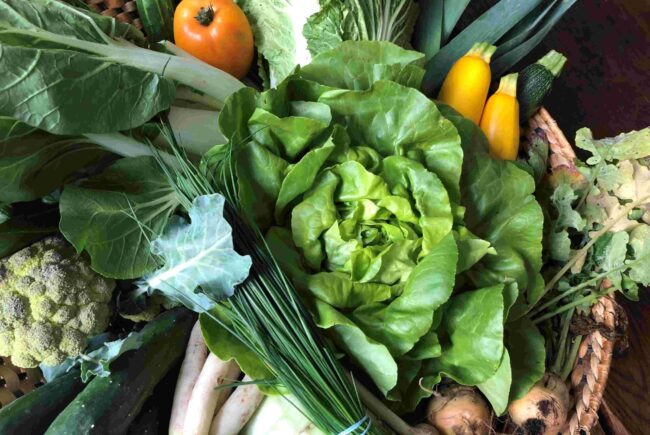
Reward for the effort: a weekly vegetable box. Photo: Solawi Muelheim.
Reward for the effort: a weekly vegetable box. Photo: Solawi Muelheim.
The way to sustainability goes through the stomach. This is the principle behind Solidarity Farming, where people are learning to grow their food without agribusiness and chemicals, like in the old times.
“Can you prepare this patch for the next planting? But please do not dig.” ‘No problem’ thinks the person receiving the request. Ahead of him lies the goal of the day: he needs to pull out the white cabbage plants row by row.
Johanna from the cultivation team is already further along, while two other women are working hard to pile up compost.
The cabbage plants prove to be very stubborn opponents: they can only be removed with a lot of force and a well-aimed blow with a machete. After about ten plants, the harvester begins to have doubts: Can’t we use a machine? Or harvest workers? So much work just for a few cabbages
Don’t wait for the end of the world ̶ get to work!
This is a typical scene in the field of Solidarity Farming (Solawi) in Mülheim, Germany. Here, as co-initiator Hans Kühnl likes to say, “social transformation becomes reality”. Instead of waiting for the end of the world, get to work!
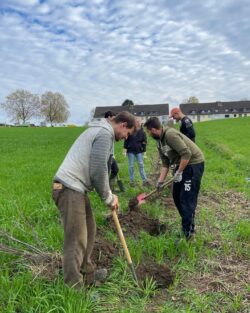
Physical work might be unfamiliar and strenuous, but healthy, for many living in a city. Photo: Solawi Muelheim.
Around 120 residents of the town of Mülheim pay two professional organic farmers and receive the fresh harvest once a week in return. Since as little machinery as possible is used, a lot of manual labour is necessary, which the project participants do voluntarily and in addition to their other tasks.
The project has been running for about a year. For the participants, it sets completely new challenges: You no longer choose your vegetables according to your own wishes in the supermarket, but every week you must think of something to prepare with what has been harvested.
Recipes with white cabbage? In a separate chat group, participants give tips for suitable dishes. What happens to the leftovers? Larger leftovers are donated. Some boil then preserve the vegetables in small jars just as their grandparents did. Others give them to friends.
What happens in winter? In the Solawi field, a deep hole in the ground is painstakingly dug by hand for cooling and storage. Winter vegetables are harvested in a foil tunnel.
Harvest day is a festive day
“We have become so used to simply buying our vegetables. Now we can experience how farming works,” says Stefanie. “It’s wonderful when my box of vegetables arrives every Thursday. The quality is completely different, everything is produced without chemicals and poisons, climate-friendly. I’m really excited about that.”
So harvest day becomes a festive day. To organise the pick-up, the participants have formed groups so that they don’t all have to simultaneously squeeze into the small storage room where the harvest is ready for everyone to collect.
On a blackboard, it says what and how much everyone can take away: “One lettuce, 450 grams of tomatoes, two kohlrabi, celery, peppers. Please harvest the beans yourself”.
Like in a beehive, the participants fly in, concentrate on taking their share from the green boxes and head home fully loaded.
Choosing the most beautiful specimens ̶ as is usual when shopping in the supermarket ̶ is taboo. Solidarity starts with the tomatoes.
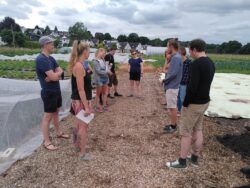
Learning together: How to produce vegetables sustainably? Photo: Solawi Muelheim.
Solawi is breaking new ground when it comes to finances. There is no fixed price; instead, everyone decides once a year what they can and want to spend. On average, it should be €120 per month.
At an online meeting, everyone enters their contribution anonymously. Added together, the sum is more than enough to run the system.
“It is important for us that we can pay our producers fairly and that they do not bear the risk. We are organised on a grassroots democratic basis.”
A registered association forms the backbone, regulates the finances and hires the two organic farmers. The field is leased from a farmer. Nothing is sold in shops or at the market ̶ everything is distributed to the participants.
The people in charge are aware that only a small minority can afford the time and commitment to take part in such a project. It requires not only financial and occasionally physical commitment, but also creative and sometimes time-consuming cooking.
The concept is not suitable for cheap mass production. Instead, it offers committed people an opportunity to participate in an innovative concept and to follow alternative paths. The local initiative is also a model for politicians and citizens to get involved themselves.
A global movement
The basic principle behind all this is based on the concept of Community Supported Agriculture (CSA) developed in the USA. According to the worldwide umbrella organisation URGENCI, there are currently about 18,000 farms with two million participants in 27 countries, in Europe mainly in Germany, France and Italy (Source: Forschungsgruppe Nascent, 2023: Handbuch Solidarische Landwirtschaft).
A recently completed EU project funded by Erasmus+ analysed the situation of solidarity farming in various European countries, has published a handbook on political work and developed training concepts.
Mülheim is a city that grew up in Germany through the steel and coal industries, just like its neighbouring towns in the Ruhr region. This is why there are hardly any rural structures here today, but a lot of industry, traffic and a constant lack of money in the city coffers.
For many people here, contact with natural resources is limited to the vegetable section of the discount store.
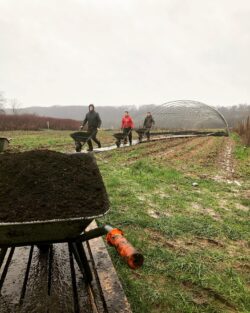
Compost is transported in wheelbarrows to the farmland. Photo: Solawi Muelheim.
Nevertheless, or precisely because of this, such a “green” movement has also formed here, which wants to advance ecological turnaround and thus also the UNESCO Sustainable Development Goals with committed comrades-in-arms.
Solawi Mülheim cooperates with schools and regularly offers workshops, for example on preserving vegetables or composting. It also takes part in public and political debate.
“Change has to go many ways before it can succeed,” says Hans Kühnl who is a spokesman for the German eco-party (The Greens) in Parliament.
Ultimately, he says, Solawi is an educational project that radiates beyond its members into the city. And the best thing about it is: “We produce food that is particularly good and tasty. The way to social transformation is through the stomach.”
Author
